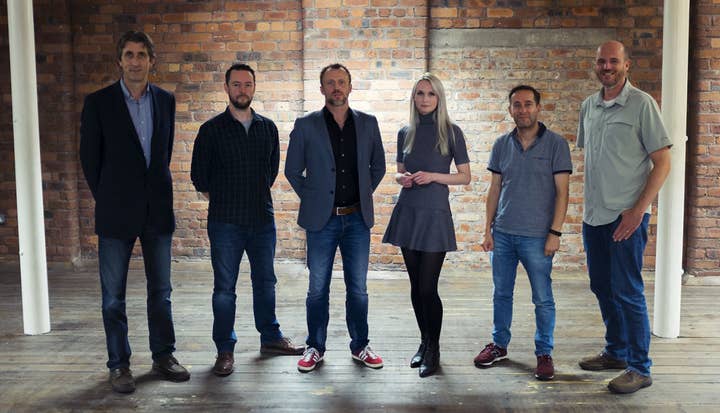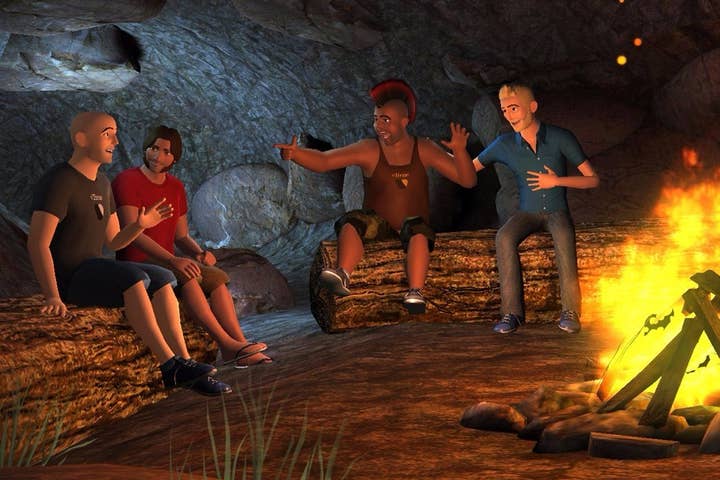Starship's enterprise: Making virtual reality truly social
The UK studio founded by PlayStation veterans believes it has the answer to social chat in VR worlds
"We kind of realised that the medium itself is the ultimate communication tool" says Martin Kenwright, CEO of UK studio Starship. He's talking about virtual reality and more specifically vTime, the studio's social app for the VR market.
"We tried to create something we thought would really help drive the market forward and start the life cycle. We wanted to come up with something with genuine value, something that you would use every day, looks slick, looks great and has fantastic technology wrapped in a beautiful set of clothes. Because that's what we used to do launching all the key titles at the start of PlayStation for example, going back many, many years."
Starship was founded in 2013 and its team features a number of veteran developers who cut their teeth at Evolution Studios and Sony Studio Liverpool, with games like MotorStorm, WipEout, Formula 1 and World Rally Championship. vTime is something very different, offering a PlayStation Home style set up where you can meet friends (via their lifelike avatars) to talk, joke or hold super important meetings. During the quick demo I try on the Samsung Gear VR we chat in various locations including a cave complete with spiders and on a speedboat.
Apart from the visuals, which are indeed slicker than expected, what's impressive is that the app can do all that with 3G and 4G networks, making it a more realistic option for communication on the move.
"We kind of realised that the medium itself is the ultimate communication tool"
"What we're doing with the first iteration of vTime - because it will grow over time, we've got a road map of many years - is to get the core mechanic, the social chat experience, working really, really well and then we add in different experiences. Some of those experiences are going to be interactive, competitive or collaborative," adds Paul Hollywood (not the baking one), head of creative at the studio.
And indeed it's easy to see the value of the technology not just to virtual reality but to games specifically. We've not seen many AAA style multiplayer VR games yet but when we do those games will need an intuitive way of offering a lobby set up or providing a space for teams to communicate.

"We took a calculated gamble well over a year ago in terms of what the social marketplace would be like and realised we could create a momentum far ahead of anybody else to really establish ourselves as key people in this space," says Kenwright.
The avatars are more natural than those we've seen in social spaces like Home before; they look like Sims but small details like hand gestures, or a bob of the head, help them feel more comfortable, less uncanny valley, than you'd expect. It also sounds like this is just the beginning for Starship, a team that's ambitious about what it wants to achieve when it comes to visual fidelity.
"We designed our experience with no controls so then we can scale up to the different platforms and their inputs as they come online in time," says Hollywood.
"We're great at creating software for hardware that doesn't exist yet"
"Similarly with the art and technology pipelines that we have in the studio, we produce at the very highest end of visual quality - which we've been doing for many years because we come from a console background - and then we downscale it to run on even really low-end devices like Google Cardboard. We've taken a lot of development wisdom from over 25 years and we're applying it to what is in some sense a low platform with mobile VR but it's also such an exciting new toy to play with."
So what attracts a team that has traditionally gone for the big games, the big consoles, to such an unknown medium? It's a question that needs to be asked of every new studio who are gambling on hardware that, Gear VR aside, doesn't have a release date or price announced.
"It's always tricky managing transition at the start of a life cycle. You live and die by your cashflow as a company so it's very important that you make sure you can not close down any opportunities or revenue streams," explains Kenwright.
"For us and for me personally this is what I've done for around 25 years. We're great at creating software for hardware that doesn't exist yet. There's probably going to be an arms race going on and we're uniquely positioned to be right in the middle of all of these giant entities and some really fantastic technology."
vTime is currently prepping for launch later this month on Gear VR, but that's just the beginning. Hollywood mentions they're also talking to a number of partners in commerce with a potential to lease experiences around certain brands, it's easy to see vTime getting picked up by big players in the games industry too. This is a studio with a five-year mission and the passion to drive the social side of VR from day one, so expect to be seeing a lot of Starship once VR is well and truly here.


